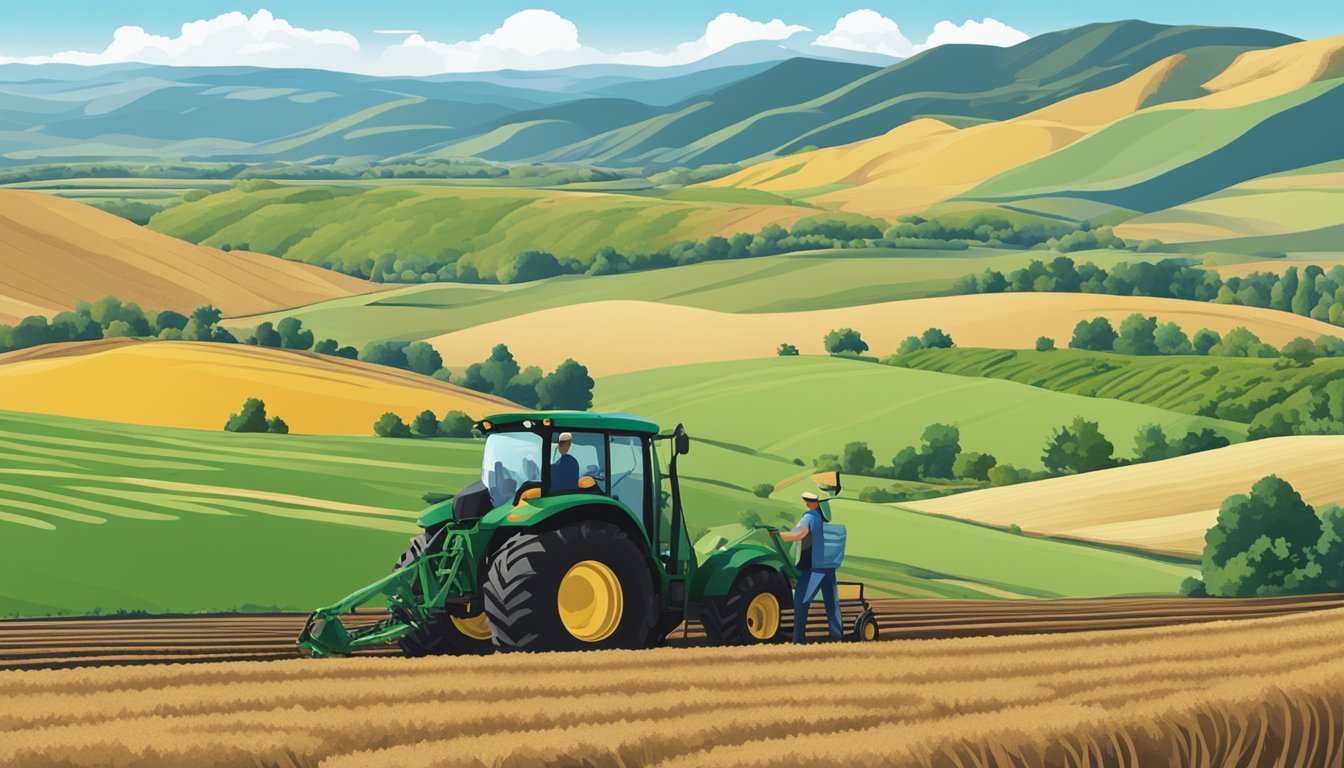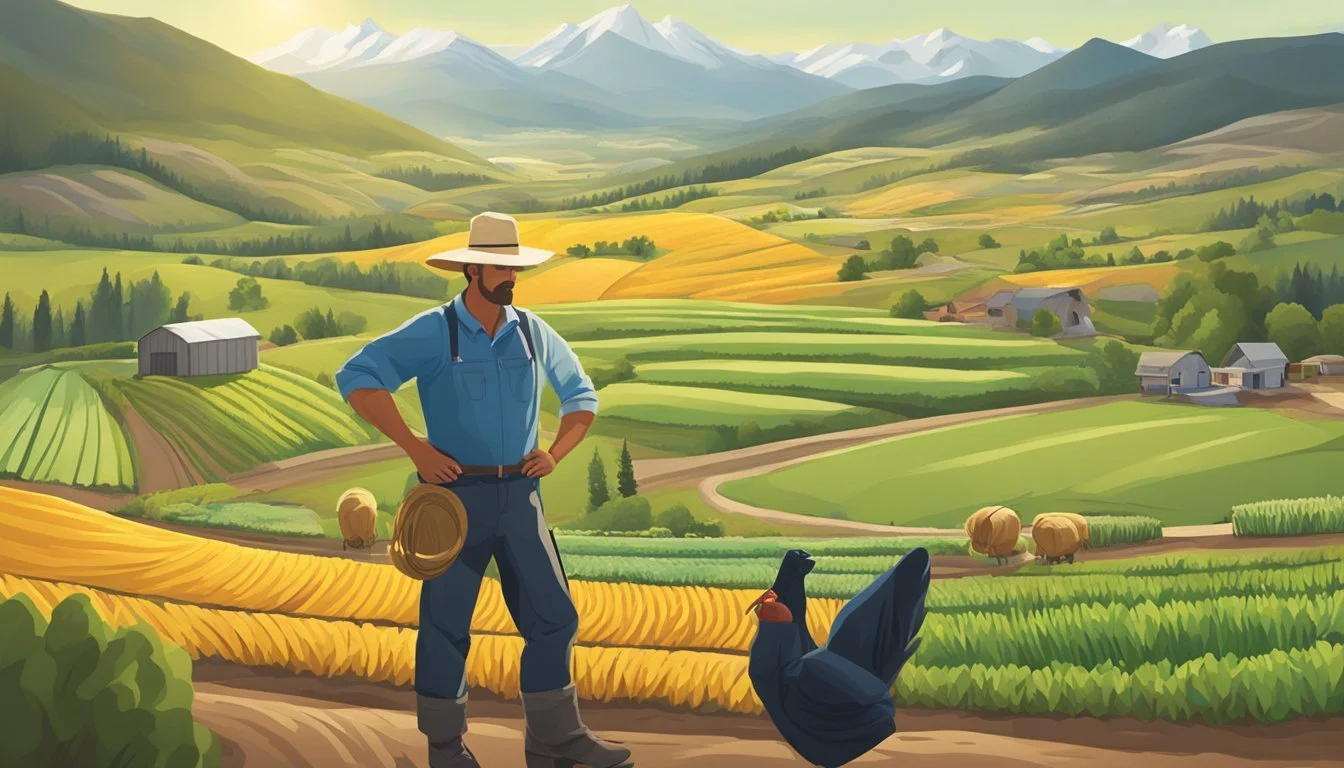Farming Grants Colorado
How to Secure Financial Support for Your Agribusiness
In Colorado, the collaboration between the agricultural community and the state government has led to the establishment of various farming grants aimed at enhancing sustainability and innovation. With a focus on addressing climate change and bolstering local food systems, these grants support projects that integrate renewable energy solutions, such as agrivoltaics, into farming practices. This investment in agricultural resilience and energy efficiency reflects a commitment to advancing Colorado's farming industry and securing its future.
Furthering this commitment, the state provides financial assistance for value-added projects, agritourism experiences, and infrastructural improvements that benefit local food producers. The strategic deployment of these funds through initiatives like the Farm-to-Market Infrastructure Grant Program and the Advancing Colorado's Renewable Energy Program demonstrates the state's proactive approach in strengthening supply chains and expanding market opportunities for farmers and ranchers. These initiatives are aimed not just at economic growth, but also at enhancing the sustainability of Colorado's rich agricultural landscape.
Overview of Farming Grants in Colorado
Colorado's Department of Agriculture actively supports the local agriculture industry through various funding opportunities. These grants aim to strengthen agricultural operations, promote sustainable practices, and bolster local food systems.
Significance for Local Agriculture
Grants offered by the Colorado Department of Agriculture (CDA) serve as vital financial resources for individuals and entities engaged in Colorado's agriculture. They are particularly aimed at conservation districts and agricultural producers who are keen to implement soil health practices. By financially supporting these practices, the state acknowledges the pivotal role of sustainable farming in both environmental stewardship and the long-term viability of local agriculture.
Primary Objectives of Grants
The primary objectives of the grants focus on:
Building resilience: With a fund of over $3 million for competitive grants, the CDA aims to enhance the resilience of Colorado's food system supply chain.
Improving infrastructure: The Farm-to-Market Infrastructure Grant Program, with awards up to $2 million, assists in improving local food systems and promoting the growth of agricultural value-added projects.
Expanding services: The Value Added Producer Grants (VAPG), under the Local Agriculture Market Program (LAMP), offer planning grants (up to $75,000) and working capital grants (up to $250,000), thus facilitating producers to expand their services in the market.
By allocating funds to these areas, the state is investing in a more secure future for the production and distribution of local goods, ensuring that Colorado’s agriculture remains competitive and sustainable.
Eligibility Criteria
Farming grants in Colorado have specific requirements that must be met for farmers and ranchers to qualify. These criteria ensure that the resources are allocated to enhance agricultural practices and sustainability in the state.
Qualifying Farmers and Ranchers
Beginning Farmers: Individuals must qualify as beginning farmers, defined as those who do not own more than 30% of the median county farm size, to be eligible for certain programs. This initiative aims to support newcomers to the industry and to invigorate the agricultural sector with fresh participants.
Residency Requirement: Applicants must be residents of Colorado and operate their farms or ranches within the state. This local residency prerequisite ensures that the aid provided directly benefits the state's agricultural economy.
Types of Agricultural Projects
Soil Health Practices: Grants are available for agricultural producers who are looking to introduce or expand soil health practices on their farms. This includes sustainable agricultural techniques that protect and enhance the quality of the soil.
Value-Added Projects: To increase resilience within the Colorado agricultural industry, projects that focus on value-added products are often encouraged. Grants are provided to help with resources and equipment necessary for processing agricultural products, thereby extending their marketability and profitability.
Farm to Market Support: Grants also cater to projects that aim to improve the marketability of farm products. These grants are especially vital for small to medium-sized farms that require assistance in reaching wider markets or upgrading their marketing techniques.
Eligibility for these programs is determined through a thorough review of the application forms, where detailed information regarding the farm or ranch, the proposed projects, and the resources needed must be provided.
Types of Farming Grants Available
Colorado offers a diverse range of farming grants to support the local agriculture industry. These grants provide financial aid for equipment upgrades, value-added projects, and agricultural research, thereby fostering innovation and sustainability in farming practices.
Grants for Equipment and Infrastructure
Grants available for equipment and infrastructure are essential for farmers who need to invest in new technology or upgrade their existing operations. The Colorado Department of Agriculture’s Farm-to-Market Infrastructure Grant Program allocates funds to improve local food systems. This may include investment in cold storage, poultry housing, or irrigation systems that are crucial for operational efficiency and quality produce.
Eligible investments:
Cold storage
Irrigation systems
Poultry housing
Value-Added and Marketing Grants
Value-Added and Marketing Grants aim to enhance a product's value, expand market reach, and stimulate economic growth by promoting Colorado's agricultural goods. The grants prioritize projects that drive development or expansion, such as creating a value-added product from a raw agricultural product or developing a robust marketing campaign to promote Colorado's farm commodities nationally.
Focal areas for promotion:
Product differentiation
Market expansion
Branding initiatives
Research and Education Grants
The emphasis on education and research through these grants supports innovative agricultural practices and sustainable farming. Programs such as the Advancing Colorado's Renewable Energy (ACRE) Program offer funding for research on energy-related projects that can benefit the agricultural sector. These grants play a pivotal role in supporting research initiatives and educational activities that lead to advancements in farming techniques.
Research focus:
Sustainable practices
Renewable energy in agriculture
By investing in these grant programs, Colorado is committed to aiding its agricultural community through financial support that promotes growth, innovation, and resilience.
Understanding the Application Process
The application process for farming grants in Colorado is a structured affair requiring attention to detail and adherence to guidelines. Applicants must prepare thoroughly to ensure their submissions are both comprehensive and timely.
Required Documentation
Applicants must gather several critical documents to support their grant application. A complete business plan is essential, detailing the farming operation's objectives and the strategic use of the grant funds. Additionally, an online application form must be filled out accurately. Technical assistance may be available for those who require help during the application stages.
Business Plan: A clearly defined plan specifying the use and impact of grant funds.
Online Form: Every grant may have its unique form, accessible through the relevant department's website.
Submission Deadlines and Review Periods
Each grant program has specific submission deadlines that applicants must strictly follow. These deadlines are often non-negotiable, and late entries might not be entertained. After the submission, there is a review period, during which applications are assessed against grant requirements. The maximum grant award amount varies by program, as do award periods, which are defined in the grant details.
Deadlines: Posted on the grant's information page and in the application materials.
Review Periods: Vary by grant; applicants are notified of timelines upon submission.
Funding and Investment Strategies
In the context of Colorado's dynamic agricultural scene, securing financial investment through grants and partnerships stands as a fundamental approach for businesses aiming to foster growth and innovation.
Leveraging Grants for Business Growth
Grants serve as a pivotal source of financing for agricultural businesses and projects. Colorado is proactively investing in its agricultural future. For example, to mitigate the impact of climate change, the state has dedicated $500,000 to agrivoltaic project grants. By strategically investing in such projects, businesses can expand their operations in sustainable ways that may not have been feasible through traditional financing alone. Additionally, competitive programs like the Farm-to-Market Infrastructure Grant offer up to $2 million to strengthen local food systems and aid in the development of agricultural value-added projects.
Grants Available:
Agrivoltaics Initiatives: Up to $500,000
Farm-to-Market Infrastructure: Up to $2 million for local food systems
Exploring Public and Private Partnerships
Partnership between public entities and private businesses unlocks potential for mutual benefits. In particular, the Resilient Food Systems Infrastructure (RFSI) program, funded by the USDA’s Agricultural Marketing Service, exemplifies the commitment to fortify partnerships that enhance Colorado's food systems. They emphasize investment in infrastructure that bolsters the resilience of the state's agricultural framework. Such collaborations between the public sector and businesses allow for shared risks and benefits, fostering an environment conducive to innovative solutions and sustained economic growth.
Partnership Types:
Public-Private Collaborations: Resilient Food Systems Infrastructure (RFSI)
Federal-State Alliances: USDA support through cooperative agreements
Impact of Grants on Colorado's Farming Ecosystem
Grants in Colorado are pivotal for enhancing sustainable agricultural practices and strengthening the local economy through bolstered food systems. They play a critical role in fostering innovation and resilience within the state's agricultural sector.
Advancements in Sustainable Practices
Grants from the Colorado Department of Agriculture (CDA) facilitate a shift towards more sustainable and resilient farming practices. For instance, STAR Plus grant funding enables agricultural producers to implement or expand soil health practices, thus ensuring long-term viability of the land. The integration of these practices reflects a commitment to environmental stewardship and a proactive approach to farming sustainability.
Boosting the Local Economy and Food Systems
The infusion of grant money also targets the economic aspect of farming. With programs such as the Farm-to-Market Infrastructure Grant, Colorado's ranchers, farmers, and food processors receive financial support to improve infrastructure, hence driving the development of agricultural value-added projects. This investment not only aids in the creation of jobs in rural areas but also helps to cement a robust local food production system, reducing dependencies and fostering local service industries tied to agriculture.
Challenges and Considerations
In addressing the complexities faced by agricultural stakeholders in Colorado, a focus on climate adaptability and supply chain stabilization remains critical. Landowners and the markets division are tasked with navigating the intricate weave of current environmental and economic challenges.
Adapting to Climate Change
Colorado's agricultural sector is heavily influenced by climate change, with unpredictable weather patterns affecting the viability of grazing lands and crop sustainability. Farming initiatives need to integrate proactive strategies to combat the consequences of a changing climate. For example, farmers are encouraged to apply for grants designed to support soil health practices that mitigate the effects of climate change.
Soil Conservation: Promoting increased soil moisture retention and carbon sequestration.
Water Management: Implementing efficient irrigation systems to cope with water scarcity.
Managing Supply Chain and Market Disruptions
The Covid-19 pandemic underscored the fragility of supply chains, emphasizing the need for resilience in food transportation and distribution systems. The markets division and landowners are working to strengthen local supply networks against future disruptions.
Transportation: Enhancing the reliability of systems responsible for moving goods from farms to markets.
Local Supply Chains: Investing in infrastructure grants that bolster the connection between producers and consumers, ensuring a steady flow of local and regionally produced food products.
Grant programs in Colorado aim to enhance these initiatives, fostering a robust agriculture industry capable of withstanding contemporary challenges.
Resources and Support Services
In Colorado, farmers have access to a variety of support services and resources aimed at fostering growth and sustainability within the agricultural sector. These initiatives are provided by state and federal agencies as well as academic institutions.
Colorado Department of Agriculture Programs
The Colorado Department of Agriculture (CDA) offers multiple programs that serve as resources to the farming community. These include grant programs such as the NextGen Leadership Grant Program and the Farm-to-Market Infrastructure Grant Program.
NextGen Leadership Grant Program: Provides scholarships and career development to support the next generation of professionals in agriculture.
Farm-to-Market Infrastructure Grant Program: Allocates up to $2 million to enhance local food systems and promote agricultural projects.
The CDA also manages the Advancing Colorado's Renewable Energy (ACRE) Program, which awards grants for energy initiatives that aid the agriculture industry.
Extension Services and Consultation
Colorado State University (CSU) extends technical assistance and industry support to the agricultural community along with providing access to research through its extension services. These services are designed to improve U.S. food production with a respect for experience and applied research.
Resources include:
Educational programs: Offer knowledge and training in agricultural practices.
Consultations: CSU specialists provide guidance tailored to individual needs.
Coupled with support from the U.S. Department of Agriculture (USDA), which presents options like the Agriculture Risk Coverage (ARC) and Price Loss Coverage (PLC) programs, Colorado farmers receive comprehensive assistance to navigate the challenges of modern agriculture.
Additional Programs and Initiatives
Within Colorado, a range of programs and initiatives provide crucial support to the agriculture industry. These schemes offer financial assistance for various projects and are especially significant for conservation and development purposes.
Specialty Crop Block Grant Program
The Specialty Crop Block Grant Program (SCBGP), funded through the USDA, represents an essential resource for Colorado's agriculture sector. This program empowers stakeholders within the specialty crops community to launch new initiatives. Their projects might include enhancing food safety measures, incentivizing innovative cropping and production systems, or addressing challenges related to pests, diseases, and phyto-sanitary issues.
Advantages Description Diverse Projects SCBGP supports a wide array of initiatives aimed at strengthening the specialty crops industry. Stakeholder Collaboration Encourages partnerships and collaboration among various industry stakeholders.
Colorado Agricultural Future Loan Programs
Senate Bill 21-248 led to the creation of the Colorado Agricultural Future Loan Program, a key agent in supporting the state's agricultural progression. This program offers loans and grants to assist agricultural businesses in navigating the economic landscape. The focus is to promote resilience and growth in farming and ranching operations.
GRIT Funding: A component of this loan program is the Guiding Resilience and Innovation Tomorrow (GRIT) fund, which backs producers adopting soil health practices.
Agricultural Processing Projects: A priority for the loan program includes fostering agricultural processing projects that can contribute to Colorado's economy by driving the development of local food systems.
Both the SCBGP and the Colorado Agricultural Future Loan Programs play pivotal roles in securing the vitality and sustainability of Colorado's agricultural industry, ensuring the state's farming future remains prosperous.








